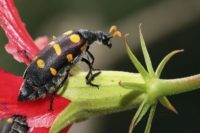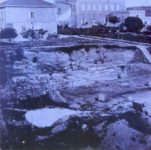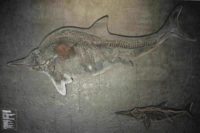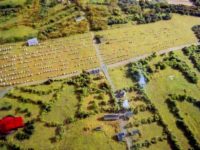By Creation Moments Every year, more and more articles appear in print and on the web concerning the effects of climate change. These experts are an elusive group. Hovering in the background, commenting on every disaster, these nameless experts are like a 21st Century gnostic priesthood in possession of secret knowledge which only those expert enough to be experts can comprehend. read more …read more Source: Creation Moments
By Sarah Chaffee On this episode of ID the Future, host Ira Berkowitz continues his conversation with Rabbi Moshe Averick about the rabbi’s book Nonsense of a High Order: The Confused World of Modern Atheism. Averick answers the who-designed-the-designer objection, shows how questions about God and intelligent design can’t be shoved aside as unimportant, and has a bit of fun recounting a dustup he had with evolutionist Jerry Coyne. Please consider donating to support the IDTF Podcast. Your browser does not support playing Audio, please upgrade your browser or find our podcast on podOmatic Download Episode …read more Source: id [More]
By Sarah Chaffee On this episode of ID the Future, Jerusalem-based guest host Ira Berkowitz talks with Rabbi Moshe Averick about his book Nonsense of a Higher Order: The Confused World of Modern Atheism, a critique of the the new atheists’ views on nature. Rabbi Averick shares his spirited takedown of the multiverse theory for the origin of life, dismantles the “God of the Gaps” objection to intelligent design, and wonders why people who criticize books like his think they can do so intelligently without taking the time to read them. Please consider donating to support the IDTF Podcast. Your [More]
By Sarah Chaffee On this episode of ID the Future from the vault, geneticist Dr. Wolf-Ekkehard Lönnig talks about his book, The Evolution of the Long-Necked Giraffe. For years, Darwinists have presented the giraffe as a textbook example of adaptive morphological change in response to environmental conditions. Tune in as Dr. Lönnig discusses the problems with the idea that millions of years of mutations could create the many differences between a short-necked and a long-necked giraffe. Please consider donating to support the IDTF Podcast. Your browser does not support playing Audio, please upgrade your browser or find our podcast on [More]
By Creation Moments During his visit to the Galapagos Islands Charles Darwin saw that each island was populated by a little finch. These birds were all very similar, yet from one island to another there were some differences in the size and shape of the beak. read more …read more Source:
By Creation Moments Over 2,000 years ago, Aristotle wrote about red snow. Today, red, orange and even green snow has been found on every continent. It is typically found in deep mountain snows in the late spring. The snow color is caused by any of 350 species of strange snow algae. read more …read more Source: Creation Moments
By Creation Moments One of the early evidences for evolution, at one time found in almost every school textbook, was based upon the salt content of human blood plasma and the salt content of the sea. Professor Macallum of the University of Toronto began with the assumption that life on earth began in the sea and that the first land creatures had retained that sea salt concentration in their blood. read more …read more Source: Creation Moments
Blister beetles of California’s Mojave Desert depend on solitary bees for their life cycle. However, the beetles have nothing of interest to offer the bees. read more …read more Source: Creation Moments
By Creation Moments The Bible portrays Jerusalem as an established city of some importance even at the time of Abraham. Yet many Biblical scholars describe Jerusalem as, at best, an unimportant settlement as late as the time of David in 1000 B.C. Now a Biblical scholar may have found the evidence to settle the issue in favor of the Biblical history. read more …read more Source: Creation Moments
By Sarah Chaffee On this episode of ID The Future from the vault, Jay Richards talks with Professor and author John Lennox about his book, Seven Days that Divide the World: The Beginning According to Genesis and Science. In his book, Lennox delves into controversial issues surrounding science and faith, answering common questions regarding apparent tensions between scripture and scientific evidence.
By Creation Moments Only two members of the cat family are mentioned in the Bible: lions and leopards. And, in any case, we can work out exactly when they were created. Cats are land animals, so they were created on Day Six of the Creation week. read more …read more Source: Creation Moments
By Creation Moments Like so many children over the last century, I was given a book about dinosaurs when I was a small boy. This book contained references to a number of extinct creatures other than dinosaurs, and one of the most fascinating to me was ichthyosaur. read more …read more Source: Creation Moments
By Creation Moments Did you know that if you stared at an object with absolutely no eye movement you would eventually go blind? Actually, it is impossible to stare at anything without some eye movement and there is a good reason for this. read more …read more Source: Creation Moments
Social insects seldom, if ever, tolerate other species within their communities. Strangers are generally identified by their smell, rather than by their appearance, since those insects that aren’t actually blind have very poor eyesight. It is common for social insects to unite to destroy even one stranger who invades their nest. read more …read more Source: Creation Moments
By Creation Moments There are certain occasions in the Bible when we are directed to look at the behavior or traits of an animal and are asked to learn an important lesson from them, behavioral or spiritual. One of the most well known of these is found in Proverbs 6:6, where we are told to “Go to the ant, O sluggard; consider her ways, and be wise.” read more …read more Source: Creation Moments
By Sarah Chaffee On this episode of ID the Future, host Sarah Chaffee talks with Center for Science and Culture co-founder Dr. John West about the Louisiana Science Education Act, passed ten years ago this week. Dr. West explains why it mattered then for academic freedom, how it’s stood up to criticism in the ten years since then, and why it matters today — including the example it sets for other states as well-crafted, resilient, and science-friendly legislation, that even the ACLU has recognized it needs to support! Please consider donating to support the IDTF Podcast. Your browser does not [More]
1 Corinthians 1:23 states, “but we preach Christ crucified, to the Jews a stumbling block and to the Greeks foolishness.” This short passage gives us an important key to reaching our culture today with the gospel message. And it ties in very strongly to the creation-evolution debate. Listen: The Institute for Creation Research
Critics posit many questions about distant starlight and the Bible. Is there a problem with stars being billions of lightyears away? How does the Bible bring clarity to this issue? And how have scientific and mathematical discoveries affirmed the Genesis creation narrative? Listen: The Institute for Creation Research
Why does Earth’s age matter? Are there better answers to the controversial methods of radioisotope dating? Is an ice core’s age simply determined by counting its layers? Brian Thomas explains why Christians need an educated response to the evolutionary stories of many geologists and media celebrities. Other episodes in this series: Stretchy Dinosaur Soft Tissue Mutation Rates Debunk Human Evolution Story Where Did All the People Come From? Saturn, Enceladus Listen: The Institute for Creation Research
Scientists have been discovering original dinosaur proteins for decades. Upon cracking open the unearthed bones, scientists have found osteocytes, collagen, and other biological materials that give us clues about dinosaur skin color. How do these discoveries transform the way scientists view Earth history? Listen: The Institute for Creation Research
By Sarah Chaffee On this episode of ID the Future, Andrew McDiarmid reads from chapter 12 of Discovery Institute co-founder Bruce Chapman’s new book, Politicians: The Worst Kind of People to Run the Government, Except for All the Others. In this excerpt, Chapman argues that Darwinism has disfigured and demoralized political life in Europe and America for more than a century. Please consider donating to support the IDTF Podcast. Your browser does not support playing Audio, please upgrade your browser or find our podcast on podOmatic Download Episode …read more Source: id the future
By Sarah Chaffee What happens to morality when the world has no meaning? On this episode of ID the Future from the vault, Discovery Institute fellow Paul Nelson interviews Rabbi Moshe Averick, who discusses his book, Nonsense of a High Order: The Confused and Illusory World of the Atheist. Rabbi Averick ran educational programs at UCLA and Northridge University in Los Angeles, and then became one of the founding faculty members of Aish Toronto and later at the Shaalvim Rabbinical Seminary in Israel. Please consider donating to support the IDTF Podcast. Your browser does not support playing Audio, please upgrade [More]
By Creation Moments On the southern coast of the Breton peninsula in Northern France is a small rural town called Carnac. It is a pleasant enough seaside resort. I remember enjoying a couple of days there with my family in 2010, at the end of a vacation touring campsites in the Vendée department of France. But while the town itself might be unremarkable, the same cannot be said for what you find in the fields outside the town. read more …read more Source: Creation Moments
By Creation Moments Where did language come from? This question is easy to answer from a biblical worldview. God created Adam and Eve with the ability to communicate. read more …read more Source: Creation Moments
By Creation Moments For many people studying the early chapters of Genesis, the account of Babel is a troubling interlude. We like to concentrate on the Creation Week, and then the Flood, and then let’s get on to talking about Abraham. But before we get to Abraham, we have this troubling account of what all these people who were the descendants of Noah and his family were doing at Babel. read more …read more Source: Creation Moments
By Sarah Chaffee On this episode of ID the Future, engineer, lawyer, and computer expert Eric Anderson continues his discussion hosted by Mike Keas on what it means that there’s information in DNA, and how this distinguishes it from most other physical objects. He talks about what intelligence really is and does — and why we know it’s involved in creating the unique information in DNA. And he recommends an answer we can give to those who “dig their heels in” and disagree on what information is about. Please consider donating to support the IDTF Podcast. Your browser does not [More]































